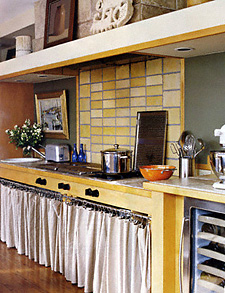Very interesting article in The New York Times, Buying Into The Green Movement. This piece talks about our eagerness to literally "buy into" the green movement, causing critics to question the fundamental issue...are we "consuming to conserve", thus, this line of thinking being a paradox? Are we eager to buy new green products, products, whether green or not green, which may not truly be needed at all, thus, creating an unnecessary environmental impact?
I can't advise new homeowners whose kitchen is 40 years old and damaged, to forego renovating their kitchen. I am not of that philosophy, although some may be. To me, THAT is an oxymoron. However, there are ways to think a little deeper as to how one can be green, with, or even without, the use of green products.
 Let's take new kitchen cabinetry. A client may have an interest in designing with "green" products. One issue, which has a huge environmental impact, of course, is fuel. A homeowner may want to consider if they really want to order green cabinetry from a fabulous and highly styled eco-sensitive cabinet manufacturer, their single order being trucked in from Washington State, if they live in New York. Is it wiser to buy cabinetry within a radius of a few nearby states, which will be delivered in a truck along with other orders for multiple local deliveries? This is one approach to thinking green in another way.
Let's take new kitchen cabinetry. A client may have an interest in designing with "green" products. One issue, which has a huge environmental impact, of course, is fuel. A homeowner may want to consider if they really want to order green cabinetry from a fabulous and highly styled eco-sensitive cabinet manufacturer, their single order being trucked in from Washington State, if they live in New York. Is it wiser to buy cabinetry within a radius of a few nearby states, which will be delivered in a truck along with other orders for multiple local deliveries? This is one approach to thinking green in another way.
And, what about countertops? I know at least one of my suppliers will make wood kitchen countertops, which can be shipped along with the kitchen cabinetry. I also carry wood countertops that come from Atlanta, Georgia, and from far away Denmark (some woods which talk of being from sustainable sources-except for the jet fuel transporting it from one place in the world to another.) Likewise, slate countertops which I use on occasion, originating from Vermont, are relatively close by and intrinsically eco friendly.
Can a kitchen be designed in a green way to use less cabinetry but still maximize storage? Absolutely. Another way to "think green." I did it in my own kitchen in some very clever ways, which I will describe in more detail down the road.
I am open to all ways of lowering our environmental impact, including the use of products which, while they may not be green according to one set of specifications, may indeed be green(er) than previously thought, when compared to how they are transported to their destination, how they are designed, or according to other alternative ways of defining "green."
Other ways of thinking about the green movement and consumer behavior are presented in this article. I thought it was very interesting.

